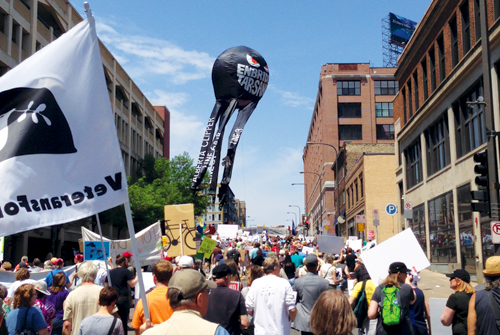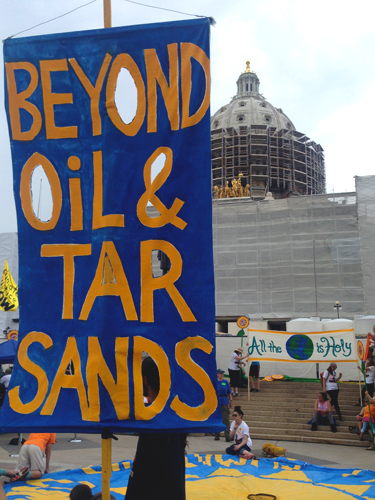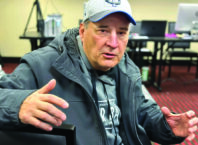 On June 6, more than 5,000 colorful,
On June 6, more than 5,000 colorful,
committed marchers snaked through the streets of downtown St. Paul
from the banks of the Mississippi River to the State Capital, the
first shrouded in morning mist, the second shrouded in construction
scaffolding. Marchers were rallying to say no to expansion of the
matrix of pipelines that cuts through northern Minnesota carrying
Alberta tar sands oil and fracked Bakken crude, potentially
endangering the freshwater heart of Minnesota’s native land.
Aztec drums and conch musicians led the
march. At the capital, Greg Grey Cloud offered a welcome song and
later there was a performance by Frank Waln, Sicangu Lakota hip hop
artist, among other musicians.
Many native speakers led the rally in
front of the capital building, as Native communities are directly
faced with the impacts of pipeline expansion and are leading the
charge against them. Winona LaDuke (White Earth Anishinabe), founder
of Honor the Earth, and Tom Goldtooth (Dine/Dakota), executive
director of Indigenous Environmental Network, have organized for
decades to call attention to better ways to manage our planet than
tearing out its natural resources and are leaders in the effort
opposing pipeline expansion.
LaDuke asked the crowd to support, “us
and tribal governments tribal leadership” who are in saying “no”
to pipelines crossing reservation and treaty lands. “[They] cannot
poison us,” she declared, telling the audience, “you have a
choice between water and oil. Make the right choice.” She told a
story that, at a protest in in Washington, D.C. a year ago, she
walked from her tipi to a ride in an all-electric car. “That’s
what the future looks like,” she said,” from a tipi to a Tesla.”
Melissa Daniels (Athabasca Chipewyan
First Nation) spoke on behalf of the estimated 23,000 Aboriginal
people who live in the devastated area of Alberta’s oil sands
development – 18 First Nations and six Métis Settlements located
in the region. She testified to the dramatic local impacts of tar
sands development and the robust resistance of native communities and
allies across Canada to pipeline expansion.
How bad is tar sands oil extraction in
Alberta? A google search for photos of Alberta tar sands turned up
this from an article in Business Insider: “These Pictures May Give
you Nightmares about The Canada Oil Sands.” And this: “We’re not
saying the project is good or bad. We’re just saying the scale and
severity of what’s happening in Alberta will make your spine tingle.”
And this from Wikipedia: Or read this selection from Wikipedia: “The
Athabasca River is the largest freshwater delta in the world but with
Suncor and Syncrude leaking tail ponds the amount of polluted water
will exceed 1 billion cubic meters by 2020.”
According to information from the
Indigenous Environmental Network, “In 2006, unexpectedly high rate
of rare cancers were reported in the community of Fort Chipewyan. In
2008, Alberta Health confirmed a 30% rise in the number of cancers
between 1995-2006. However, the study lacks appropriate data and is
considered a conservative estimate by many residents. Caribou
populations have been severely impacted by tar sands extraction. The
Beaver Lake Cree First Nation has experienced a 74% decline of the
Cold Lake herd since 1998 and a 71% decline of the Athabasca River
herd since 1996. Today, just 175 – 275 caribou remain. By 2025, the
total population is expected to be less than 50 and locally extinct
by 2040.”
With signs and activism, the marchers
in St. Paul said, “this IS bad!”
Participants also heard from Bill
McKibben, a pioneering climate journalist and distinguished scholar
at Middlebury College in Vermont. McKibben wrote the first book on
the climate crisis 26 years ago, “The End of Nature,” and founded
350.org in 2008 as a grass roots climate advocacy organization. The
number 350 refers to parts per million (ppm) carbon dioxide, the
number many scientists believe is the maximum carbon dioxide
concentration in the atmosphere before climate tips significantly
away from historic norms.
The current concentration, according to
NOAA data, is 402 ppm, rising about 2ppm a year. McKibben told the
crowd that Minnesota is “ground zero” for stopping oil pipeline
expansion and climate change, and complemented the marchers for their
organized energy and activism.
A surprise powerhouse speaker was
Alilah Sanders-Reed, a student at Macalaster College in St. Paul, who
roused the crowd with a plea for her generation who faces the brunt
of the climate crisis.
The rally peacefully dispersed under
cloudy St. Paul skies. But the battle against destructive fossil fuel
development continues at the Public Utilities Commission, the
Legislature, across northern Minnesota, in Alberta and around the
earth. On June 14, more than 100 scientists delivered a statement to
the Canadian government, saying “expanding tar sands will be
catastrophic for the climate and environment.”





